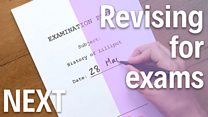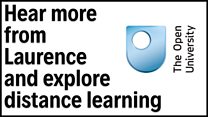Unit 10: Go The Distance: Succeeding in exams
Select a unit
- 1 Go The Distance: Choosing distance learning
- 2 Go The Distance: Academic reading
- 3 Go The Distance: Academic talk
- 4 Go The Distance: Academic writing
- 5 Go The Distance: Finding and using source material
- 6 Go The Distance: Going the distance
- 7 Go The Distance: Critical thinking
- 8 Go The Distance: Social learning
- 9 Go The Distance: Projects
- 10 Go The Distance: Succeeding in exams
Session 2
Academic Insights 10 – Succeeding in exams
Welcome back to Academic Insights – the series where we interview distance learning experts and get their tips on how to be a top-class student. This time we're looking at the part of a course where your knowledge is put to the test: exams! Meet tutor Laurence and hear his tips for getting the A grade!
Activity 1
How exams work on distance learning courses
Laurence Knell is a distance education tutor and he has a lot to say about assessment. We asked him to share some tips for students getting ready for exams on their distance learning courses. Scroll down to watch the video and get on your way to excellent exam results! To help you, take a look at the definitions of some key words from Laurence's video in the Session Vocabulary box.

#7 things you really need to know
How do exams work in distance learning? Laurence Knell answers your questions in 3 minutes.
To do
Scroll down to watch the video and find out:
- Why students have to take exams
- The benefits of taking exams (yes, there are some!)
- How exams are organised for distance learners
- How to deal with exam nerves
- The number one thing to do in exams to make sure you get the grades you deserve
- And more!
Watch the video

Laurence
My name is Laurence Knell. I'm a distance education tutor.
Exams have a very important purpose. They are a great opportunity for the university to understand the student's progression, understand their learning, and how well - or otherwise - they may be learning.
For a student, they also play a very important role, in helping them consolidate their knowledge, gain greater insight and understanding into what they've been learning, but also to demonstrate that knowledge. So actually, for a student, I would say that they have a very positive purpose as well.
For distance learners, typically exam centres are set up in central locations. So, whether they're, for example, in the UK but in different parts of the UK, or maybe in mainland Europe. So, for students who are unable to reach an exam centre, my university will work with them and their organisation, to ensure that a responsible person within the organisation is able to monitor the exam and create exam-like conditions for them. I've even heard of students who were sailing round the world on ships sitting exams.
Yes, there can be additional challenges. And that's where practice, repetition and rehearsal really play an important role. Focus on answering the question, making sure that their response is clear, simple and concise, and that their grammar is as simple as possible.
Ideally, yes. It is an exam in an academic context. However, it is understood that nobody writes the same in an exam as they do in a formal assignment or other piece of written work.
A good student exam paper, simply put, is legible. It has to be readable. It needs to be concise. It needs to be to the point and, most importantly, it needs to answer the question, using relevant evidence and examples from the course and elsewhere.
My advice to students who are really nervous in exams is to see it as an opportunity: an opportunity for them to demonstrate to their tutor - to the markers - that they actually do know the material, they have engaged with the course, and to see it in a positive light.
Go the distance.
Laurence's tips for excellent exams
We hope you've picked up some top tips to help you prepare for your distance learning exams. Let's recap the #7 things we've learned about excellent exam technique.
- Exams are useful tools that universities can use to understand how well their students are doing.
- By doing exams, students can consolidate their knowledge, get a better idea of what they have been studying and demonstrate what they know.
- Distance learning exams are held in central locations – if students can't get to an exam centre they can make arrangements to take the exam elsewhere.
- Non-native speakers may find exams challenging – practice, repetition and rehearsal of exam technique is important to be well prepared.
- Using academic language in exams is important, but don't stress about it – nobody writes the same way in an exam as they do in a formal assignment.
- Legibility is key – your exam answers need to be readable. Make sure your writing is concise and answers the question, using relevant evidence.
- Don't let exams make you feel nervous! It's your chance to demonstrate to your tutor and the exam markers what you know.
Session Vocabulary
Find out more about distance learning – visit our partner,The OU
____________________
To help you understand Laurence's video tips, take a look at these key words and phrases and their definitions:
consolidate
combine things together so they become more effective: they can be physical things, or abstract concepts such as knowledge of a topicinsight
the ability to understand something clearlyconcise
short and easy to understand


